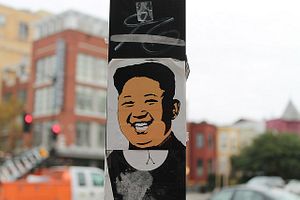On Wednesday, following the release of a U.S. State Department report detailing human rights abuses in North Korea, the U.S. Department of the Treasury announced a new list of North Korean individuals and organizations that would face sanctions “for their ties to North Korea’s notorious abuses of human rights.” The U.S. Treasury’s Office of Foreign Assets Control (OFAC) designated North Korean leader Kim Jong-un, ten other North Korean officials, and five organizations. Kim’s designation represents a significant escalation in U.S. sanctions against North Korea. (John Power has more over at our Koreas blog.)
Crucially, Wednesday’s designation represents the first time since Kim’s ascent in 2011 that the United States has gone after the young leader of the hermit kingdom directly. You might wonder why Washington hasn’t done this before. After all, there is no mistaking Kim’s complicity in presiding over what is without a doubt the world’s most repressive state. Why wait until now to sanction Kim under what appears to be a noncontroversial sanctions designation as a human rights abuser?
It hasn’t been that simple for Washington. Remember, the Obama administration, pursuing a policy of strategic patience, long held out after Kim’s rise to power for a possible good faith overture by the North Korean regime. The idea was that Washington would leave the door ajar on the moribund Six Party Talks after Kim’s ascent in 2011 and wait on Pyongyang to show some serious interest in resuming multilateral talks. This was always predicated on North Korea taking some initial steps toward denuclearization. To keep the door ajar, Washington couldn’t put Kim under the sanctions thumb directly, for who knows how North Korea would react to such an affront.
Wednesday’s declaration suggests some degree of recognition by the Obama administration that the strategic patience window is about to shut for good. Consider also that this new sanctions list comes a month after the U.S. Treasury designated North Korea a top “money laundering concern” in June. (More on that here.) This latest spate of U.S. sanctions activity accompanies United Nations Security Council Resolution 2270, widely seen as the harshest Security Council-backed sanctions regime against any state in some two decades.
The sanctions designation is also interesting because it is likely to have a marginal impact in the end. Kim Jong-un and his coterie of North Korean elites have their ways to move money around, albeit with difficulty. Given existing UN sanctions and the lack of any serious North Korean financial stakes inside the U.S. financial system, it’s safe to say that this is more about prodding the North Korean leadership than impacting Kim’s finances. If there’s one thing North Korea’s government abhors, it’s seeing members of the Kim dynasty subject to international opprobrium and scrutiny. (Recent examples of such scrutiny include everything from last year’s UN report on human rights in the country to 2014’s satirical U.S. film The Interview.)
I don’t doubt we’ll see some form of protest coming from Pyongyang over this latest designation. As I discussed earlier this year, Pyongyang was quite upset about the UNSCR 2270 sanctions. North Korea may simply decide to fire some more missiles into the Sea of Japan, as it is known to do to signal its displeasure with the United States and South Korea. Alternatively, it may decide to put its subconventional warfare capabilities to work and attempt a cyberattack against a U.S. target, potentially leading to U.S. retaliation under a new executive order signed last year. Either way, with Kim Jong-un called out by name in new U.S. sanctions, I’d be surprised if Pyongyang decided to take it in stride and carry on.

































